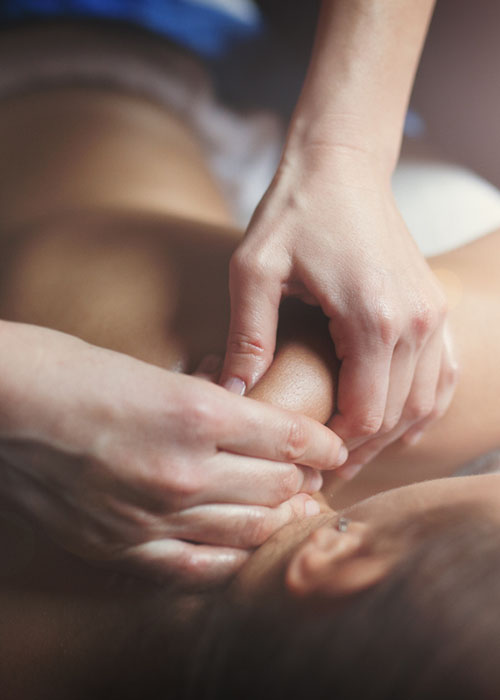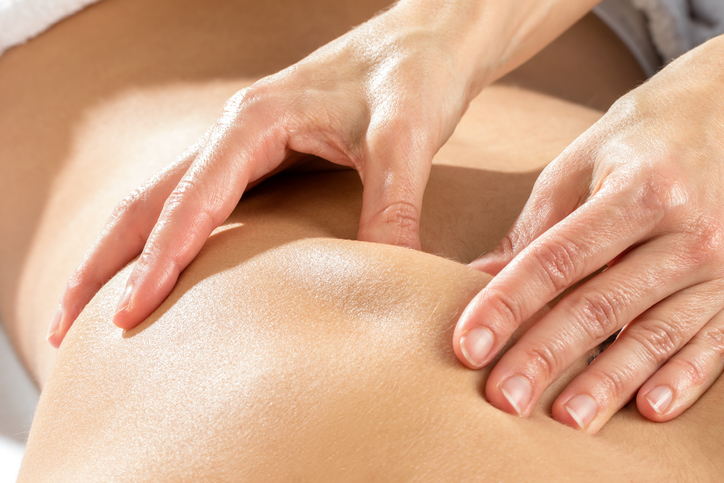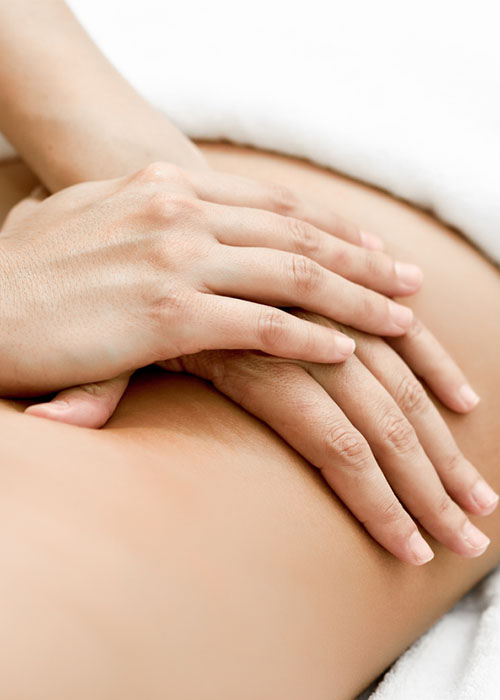Massage Therapy & Bodywork
Meet our Team
Danielle
WebB,
RMT
REGISTERED MASSAGE THERAPIST

Danielle Webb graduated from the Massage Therapy Program at WCCMT in 2022 and has been absolutely loving building her practice at Phi. Her passion for health and wellness began at an early age and has evolved in a holistic way. Her studies began in 2015 with Holistic Nutrition at Pacific Rim College. This grew into a natural passion for herbalism and growing food, which led her to study Permaculture Design & Earth Activist Training in 2016 and later to pursue a Diploma of Permaculture Design & Resilient Ecosystems at Pacific Rim College in 2019. During that program an innate connection and desire to support women’s health rose in her, which led to a completion of her Holistic Doula Training at Pacific Rim College in 2020. With her nurturing and compassionate nature combined with a lifelong vison of offering a space to hold somatic healing for those in her community, Massage Therapy seemed like the natural route to go. Danielle believes in a hands-on approach to healing with the intention of guiding people back into their bodies, as a place to feel whole and at home. Her treatment style is intuitive and receptive to the ever-changing needs of the body and draws on myofascial release, trigger point therapy, deep tissue work and general swedish massage techniques.
Kendall
Brunner
Certified Bodywork Therapist
Somatic Experiencing® Practitioner
Counsellor in Training

Kendall is a Certified Bodywork Therapist, Somatic Experiencing® Practitioner (SEP), and a Counsellor in Training with a deep respect for the body’s innate intelligence. Her work is rooted in the understanding that the body holds experiences the mind may forget — and that unresolved stress and trauma can live on as chronic tension, pain, and patterns of dysregulation.
Kendall brings a curious, attuned, and collaborative presence to her sessions. She is especially interested in the intersection of the nervous system, emotional experience, and physical structure, and how gentle, well-paced bodywork can support regulation, resilience, and embodied awareness.
Sessions are co-creative and client-led, blending skilled hands-on work with nervous system support. Together, you may explore chronic tension patterns, alignment and mobility, breath and awareness, and the subtle cues of the body — both on and off the massage table. The intention is not to “fix,” but to support your capacity to listen, respond, and reconnect with your body in a way that feels safe and empowering.
Sessions with Kendall are slow-paced, collaborative, and guided by the nervous system. You can expect a blend of hands-on bodywork — such as myofascial release, deep tissue techniques, joint play, and craniosacral therapy — alongside breath, somatic awareness, and regulation support.
This work is well suited for those experiencing chronic tension or pain, stress and burnout, nervous system overwhelm, or anyone seeking a more trauma-informed, relational approach to bodywork. The intention is not to force change, but to create the conditions for the body to soften, organize, and respond in its own time.
Kendall’s approach supports both physical and emotional well-being, helping clients build greater regulation, mindfulness, and somatic awareness that extends into daily life.
-
Certified Bodywork Therapist (750-hour hands-on training)
Vancouver School of Healing Arts -
Somatic Experiencing® Practitioner (SEP)
Somatic Experiencing International -
Registered Therapeutic Counsellor in Training
Rhodes Wellness College -
Craniosacral Therapy – Level I & II & SER1
The Upledger Institute International -
Deep Flow® – Levels I & II
Deep Flow Method -
Internal Family Systems (IFS) – Foundations Online Circle
Internal Family Systems Institute
Appointments
Phi Services
Massage Therapy & Bodywork Services
For initial visits, we recommend a 90 minute session.
For follow up visits, we offer massages of the following lengths:
30 minutes
45 minutes
60 minutes
75 minutes
90 minutes
120 minutes
Gift Certificates are available.
Please provide advanced notice to accommodate any specific needs.
All appointment changes and cancellations require 24 hours notice and may be subject to a cancellation fee.
Book an appointment
Book an appointment with our
Therapists at Phi Massage
& Well-being Centre.
Massage Therapy
FAQ
Are the Massage Therapy Services provided eligible for Extended Benefits?
Yes. All Registered Massage Therapists are eligible.
Are the Certified Bodywork services provided eligible for Extended Benefits?
Each insurance plan is different and we recommend reaching out to your provider to get clarity on the detailed coverage of your plan. Bodywork is non-registered so some plans will not cover but Kendall is a Certified Bodywork Therapist, Life Coach, Somatic and Craniosacral Practitioner and a lot of plans are adjusting to coverage these types of alternative treatments.
What is massage therapy?
Massage has been around for centuries.
The Chinese developed massage as a therapeutic tool over 4,000 years ago
There are Egyptian wall paintings estimated at ~2,330 BC that depict a physician’s practice of massage.
The ancient Greeks and Romans used massage as one of their principal means of healing and relieving pain.
In the early 5th century BC Hippocrates- the father of medicine- prescribed its use and wrote “The physician must be experienced…in rubbing…for rubbing can bind a joint that is too loose and loosen a joint that is too rigid.”
After the fall of Rome in 5thC AD the western world lost touch with the use of massage.
The Arabians continued to study classical teachings of the healing arts.
Shiatsu was introduced to the Japanese Buddhist monks in the 6thC.
Ancient Tibet developed its own style of massage.
Western massage was revived in the 6thC through the work of a French doctor, Amrobise Pare.
At the beginning of 19thC, a Swedish fencing master named Per Henrik Ling combined his knowledge of gymnastics and physiology with ancient techniques, creating smooth kneading manipulations, small circular movements and brisk rapid blows.
Massage therapy has evolved greatly in the last century combining ancient techniques with current understandings of anatomy and physiology. There are new modalities and styles evolving constantly combining all different approaches.
Massage Therapy now is defined as a combination of art and science.
What is Bodywork?
Bodywork is a term used to describe various therapeutic practices that involve working with the body to promote health, relaxation, and well-being. It encompasses a wide range of techniques and modalities aimed at addressing physical, emotional, mental, and sometimes even spiritual aspects of a person’s health.
How is Certified Bodywork different than Registered Massage Therapy?
Bodywork is a broader term that encompasses a wide range of therapeutic techniques and approaches beyond massage. While massage may be a component of bodywork, bodywork can also include practices such as Reflexology, Craniosacral therapy, energy healing, and more. Bodywork modalities may focus on manipulating the body’s structure, energy systems, or both, and can have varying goals such as pain relief, stress reduction, emotional healing, or spiritual growth. Registered massage is regulated and lives within a specific scope of practice while bodywork is typically more integrative and holistic.
Do you provide Online booking?
Yes. Some of our therapists offer this option for booking.
Does your facility meet COVID-19 safety standards?
Yes. We are mandated by our governing body the College of Massage Therapists of BC to follow a set of safety standards. These standards are in accordance with the Provincial Health Officer of BC. We are also following the recommendations of the Massage Therapy Association of BC and Worksafe BC to meet to ensure public safety and meet liability requirements.
What are the benefits of massage therapy?
The benefits of massage are innumerable. Massage can help you maintain physical, mental, and emotional well-being. Massage may be the oldest of health treatments, many discomforts can be recognized and treated by direct contact with skin.
Working with the body to release physical holding patterns and tension has had proven positive results for all kinds of conditions and symptoms, including and not limited to:
- Headaches
- Migraineshronic Pain
- Acute Pain
- Whiplash
- Fibromyalgia
- Depression
- Sleep Disturbance
- Low Back Pain
- Sciatica
- Plantar Fasciitis
- Sprains
- Strains
- Frozen Shoulder
- Carpal Tunnel
- Tendonitis
- TMJ
- Thoracic Outlet Syndrome
- Digestive Disorders
- Respiratory Conditions
- Stress
- High Blood Pressure
- Chronic Fatigue
- Chronic Myalgia
- Osteoarthritis
- Postural Discrepancies
- Post Surgery
- Pregnancy
What are the different types of massage therapy?
There are many different modalities that massage therapists can train in to hone their skills, that is what makes each therapist unique and different from each other. Please refer to the biographies of each of our therapists to get a more clear understanding of what experience and techniques the therapists at Phi have to offer.
How often will I need to book a massage?
Each person’s need is very individual. It will depend on the reason for your visit and how active you are in potentially recreating injury. As an example, an office worker will have very different needs compared to a mechanic. Your therapist can advise you on the regularity of treatments.
Massage has the greatest benefits over time. The therapeutic effects of massage are cumulative, so the more often a person gets a massage, the better he or she will feel and the more quickly one’s body will respond. If you are getting a massage to address chronic muscular tension or recovery from a soft tissue injury, more than one session is usually needed, so be prepared to schedule several sessions.
Should I alert anyone to any physical ailments or special needs I may have?
Each guest is unique. Please let us know in advance of special conditions we should be aware of such as pregnancy, HBP, heart conditions, etc. This will allow us to further personalize your service.
What shall I bring?
Yourself!
Sometimes it is advised to bring a pair of comfortable shorts and for women a sports bra.
How early shall I check in?
Please ensure you have filled out your Intake Forms prior to arrival and arrive at your scheduled time.
What can I expect at a first massage visit?
You can expect to fill out a waiver form upon arrival.
At your initial visit, your therapist will review your Intake Form with you to assess your goals for treatment. Once this is determined, you will be asked to get onto the table for your massage experience.
At the conclusion of your massage experience, you can expect to feel changes for up to four days. It is important to drink lots of water after a massage and you are encouraged to call if you have any questions or concerns.
What kind of Massage oil do you use?
Not all forms of massage require oil and there are many types of oil used for massage.
Many are a blend of a number of different carrier oils. Therapists at Phi primarily use Grapeseed or Coconut oil. It is found to have a very low allergic response. Therapists at Phi also use Essential oils.
- Grapeseed oil is rich in linolic acid (an essential fatty acid) – important for skin and cell membranes. It is purported to have regenerative and restructuring qualities and has great skin moisturizing properties. This is a fine, non-greasy, textured oil with a slightly sweet hint of a nutty aroma and with a satiny finish. It contains vitamins, minerals, and protein, GLA and a small amount of vitamin E.
- Coconut oil is an excellent massage oil because of its high saturated fat content. It contains no chemicals or toxins that may irritate sensitive skin. It can be scented or unscented and is very moisturising.
- Essential Oils are essences and scents derived from all-natural ingredients that have varying effects on the body. Essential Oils are only used when no allergies are present and specifically requested or indicated.
What are some Complementary Therapies to Massage?
There are many Complementary Therapies that work very well in conjunction with Massage Therapy.
Some highly recommended therapies are Allopathic Medicine, Acupuncture, Chiropractic Care, Physiotherapy, Kinesiology, Naturopathic Medicine, Counselling, Pilates, and Yoga.
Do I really need a massage?
Many people consider massage a pampering experience, but it has important health benefits. In fact, you get the most benefit when it is part of your regular wellness routine.
Let’s face it, most people spend more time on their cars than on themselves. Wellness Centers provide stress-free, non-competitive experiences in settings that promote rest and relaxation. They offer a time all too rare these days – to focus on you, take better care of yourself and totally unwind.
Ultimately a massage experience is unique for each person. Massage therapists cater to people who want to improve their mind, body and spirit, all you need to do is start looking for the right therapist for you. Just remember, despite their variety of offerings, they all have one thing in common – they all specialize in wellness.
What are the benefits of Hot Stone Massage?
Hot stone massage offers various benefits, including:
Muscle Relaxation: The heat from the stones helps relax tense muscles, allowing the massage therapist to manipulate tissues more effectively.
Improved Circulation: The warmth of the stones promotes increased blood flow, aiding in better circulation and the delivery of oxygen and nutrients to tissues.
Stress Reduction: Hot stone massage induces a deep sense of relaxation, helping to alleviate stress and anxiety. The soothing warmth contributes to a calming experience.
Pain Relief: The combination of heat and massage can effectively reduce muscle pain and discomfort, making it beneficial for individuals dealing with chronic pain conditions.
Enhanced Joint Flexibility: Hot stones can help improve joint mobility and flexibility by reducing stiffness and increasing range of motion.
Improved Sleep: The relaxation induced by hot stone massage can positively impact sleep patterns, helping individuals achieve more restful and rejuvenating sleep.
Release of Toxins: Heat encourages the body to release toxins through improved circulation and increased sweating, contributing to detoxification.
Balancing Energy: Hot stone massage is believed by some to help balance the body’s energy flow, promoting a sense of harmony and well-being.
It’s important to note that individual experiences may vary, and people with certain medical conditions should consult with their healthcare provider before receiving hot stone massage therapy.
Ultimately a massage experience is unique for each person. Massage therapists cater to people who want to improve their mind, body and spirit, all you need to do is start looking for the right therapist for you. Just remember, despite their variety of offerings, they all have one thing in common – they all specialize in wellness.


